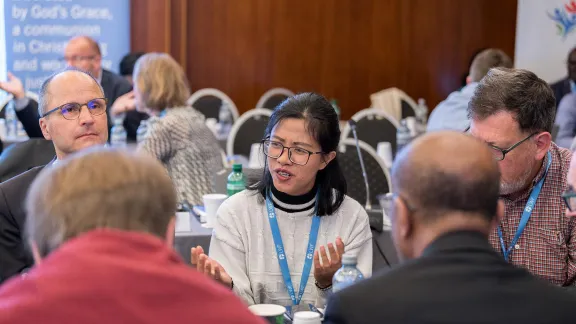
LWF Council members in a discussion, during the June 2024 meeting at Chavannes-de-Bogis near Geneva, Switzerland. Photo: LWF/Albin Hillert
Council-appointed team will develop study document to support LWF member churches and country programs
(LWI) – The Lutheran World Federation (LWF) has established a study group to advance work on the Thirteenth Assembly call to deepen theological reflection on Lutheran peace ethics in the face of current global challenges of conflicts and wars.
The Study Group on Peace and Reconciliation in Contexts of Conflict and War was appointed by the LWF Council at its meeting in June. The objective is to develop a study document with theological insights and interdisciplinary perspectives on the impact of conflict and war on the church's public witness, LWF’s humanitarian response and human rights advocacy.
Approving members of the group, its terms of reference and responsibilities, the LWF governing body addressed the need for “a theological update and interdisciplinary analysis” of the Lutheran communion’s work in peace building. The most recent extended theological contributions, the Council noted, date back to 1984 and 1990.
This renewed focus is a reminder that our actions for peace must be accompanied by theological reflection that critically addresses contemporary and complex questions surrounding conflict and war.
Rev. Dr Sivin Kit, Director, LWF Department for Theology, Mission and Justice.
“This renewed focus is a reminder that our actions for peace must be accompanied by theological reflection that critically addresses contemporary and complex questions surrounding conflict and war,” noted Rev. Dr Sivin Kit, Director of the Department for Theology, Mission and Justice.
The backdrop of the study group’s work is the devastating reality of war for children, women, men and whole communities in many places around the world: loss of life; physical and mental suffering; uninhabitable cities, towns and villages; environmental damage; and use of sexual violence as a weapon of war.
Solidarity with the most vulnerable people
Topics that will be considered include a just war theory, self-defense, and the nexus between peace and justice. The study group will also consider both the local and global impact of conflicts and wars, the geopolitical power dimensions, and consequences on economic and food security. In such complexities, “deeper theological reflections draw on a heightened awareness of the ambiguous roles that churches and faith actors can have in conflicts and war,” the Council noted.
Interdisciplinary analysis is a core part of the study in view of considerable changes in the political landscape since 1990. Escalating conflicts, nuclear deterrence politics, the arms race, climate emergency, rise of authoritarianism, and technological advancement such as artificial intelligence and autonomous weaponry are of specific concern. Serious violations of international humanitarian and human rights laws will also be addressed. The group will also suggest further resources to support LWF’s work in peace building.
The study group is an important step in supporting the theological response that affirms the Thirteen Assembly affirmation that “our faith calls us to be messengers of justice, peace and reconciliation, standing alongside those who are most vulnerable.”
Balanced representation
The Council selected the group members based on regional and gender balance, and expertise. It comprises lay, ordained, male, female and young theologians experienced in peace ethics, including church leaders who have served in conflict and war-affected contexts. The General Secretary will appoint the study group’s chairperson.


